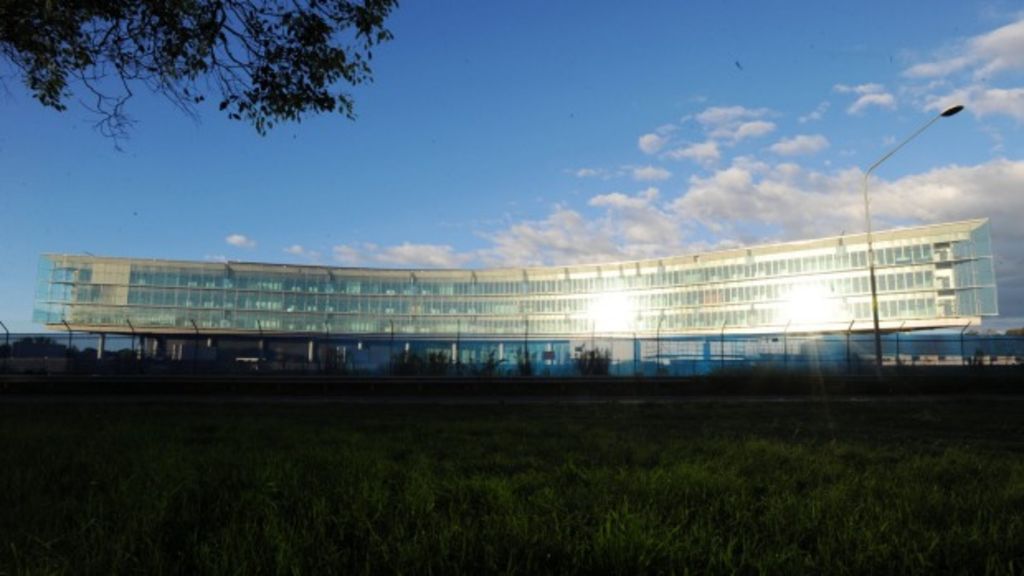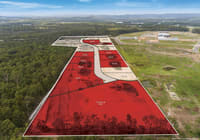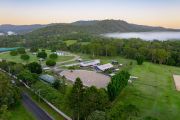
ASIO's new Campbell 5 neighbours' links to Chinese government
Primrose Riordan and Markus Mannheim
Chinese billionaire Liang Guangwei, the head of a state-backed technology conglomerate with high-level political connections, has been linked to the $64 million purchase of land next door to the new headquarters of Australia’s domestic spy agency.
Mr Liang, a former People’s Liberation Army soldier who has hosted Chinese leaders including former president and premier Hu Jintao and Wen Jiabao at his company Shenzhen Huaqiang’s corporate offices, was a director of the company that bought the land next door to ASIO until a month before the sale, documents show.
The director and main investor of the company, called SHL Development, Jia Liang, shares a house with Mr Liang, and Chinese state media have reported Mr Liang’s wife is also named Jia Liang.
 The Campbell 5 development is opposite ASIO’s headquarters. Photo: Jeffrey Chan
The Campbell 5 development is opposite ASIO’s headquarters. Photo: Jeffrey Chan
The revelations come amid heightened controversy over overseas investment and as a loophole allowing states and territories to sell government-owned property to foreign investors without the need for FIRB approval is reviewed by Treasurer Scott Morrison.
Pointing to the exemption, ACT Land Development Agency said the purchase by SHL of the Campbell 5 site did not go through the Foreign Investment Review Board, and they were told the investors were Australian citizens, according to the Australian Financial Review.
Regardless, executive director of the Australian Strategic Policy Institute, Peter Jennings, said the sale should have “absolutely” gone through FIRB considering the links to Shenzhen Huaqiang and if it had not, it was “a problem”.
“It’s a bit like the Port of Darwin situation where, because it’s a territory government sale, it didn’t need to go through the FIRB.
“I think this is a problem … there doesn’t seem to be a comprehensive approach to making comprehensive national security assessments of these sales. It’s clearly a loophole and it’s something that needs to be closed,” he said.
An ACT government spokesman said “at no stage has ASIO approached” them about the development.
Mr Jennings said he would have thought the agency would be interested in such a link.
“I would think this is something that should be considered … by ASIO in terms of what does it mean for the physical security and the communications security of the building,” he said.
Mr Liang was the director of SHL until a month before the group bought the Campbell 5 site, according to ASIC records.
Family friends minding the place confirmed to The Australian Financial Review that Jia shares a residence on Canberra’s plush Mugga Way with Mr Liang, a property purchased for $7.2 million, the second largest sale in Canberra in recent times.
Money trail links SHL to Shenzhen Huaqiang
With documents linking senior executives of Shenzhen Huaqiang, which used to make Chinese military weapons, to SHL, ASPI’s Mr Jennings said successful Chinese companies are inevitably linked to the Communist Party.
“[This shows] the very murky and imprecise nature of connections between Chinese business and the Chinese state. Any successful business is going to have to have a connection to the Chinese Communist Party, that’s how it operates,” he said.
Both SHL Developments and the Canberra entrepreneur’s company New Territories are part owned by Ms Liang’s 338 Investment, according to ASIC records.
And Shenzhen Huaqiang’s head honchos sit on New Territories’ board.
Three of the Shenzhen company’s directors – Guangwei Liang, Ze Hong Zhang and Zi Bo Niu – sit on New Territories’ board and the fourth director, Gary Chun Kin Liu, is listed as part of their senior leadership team by Canberra companies he now works for.
Ms Liang’s 338 Investment shares office space in Mitchell with New Territories, according to ASIC documents and up until August last year SHL Development was also located at the New Territories offices.
Guangwei Liang well connected
Shenzhen Huaqiang and Mr Liang are well connected with the Chinese government.
The company’s website shows a slew of Chinese leaders, including Wen Jiabao, visiting the company and meeting with Mr Liang.
Shenzhen Huaqiang was 100 per cent owned by the Guangdong provincial government up until 2005, when Chinese state media report it was mostly privatised.
Chinese media reports suggest the state still held on to a 9 per cent stake, however.
Chinese state media have also reported that when Huaqiang was being bought out it resulted in significant losses of state assets.
The reports allege that instead of the shareholdings landing fairly among company staff, the top management – including the Liangs – took control.
Shenzhen Huaqiang’s entertainment business also receives government subsidies to the tune of hundreds of millions of yuan each year, according to Chinese state media reports.
Questions over SHL director’s role
There is also a question over whether a current SHL director was the Australian manager for Shenzhen Huaqiang.
In a Shenzhen government publication a man with the same name as SHL Development managing director Xi He is introduced as the general manager of the Australian branch of the Shenzhen Huaqiang group.
Senior members of the ACT government are acquainted with Mr Liang, with now Senator Katy Gallagher visiting his offices in Shenzhen last October when the ACT government signed an economic agreement with the Shenzhen government.
Mr He said in the article that Shenzhen Huaqiang helped broker the agreement between the two governments.
Responding to questions, a spokesman for ACT Chief Minister Andrew Barr said: “Dr Xi He advises he is neither a director nor an employee of Huaqiang”.
Mr Barr said the company was made up of local investors, and insinuations otherwise were “racist”.
“SHL Development is a local company with all directors and shareholders being Australian citizens and long-term Canberra residents.
“The Commonwealth’s decision to locate the ASIO building adjacent to a residential area is a matter for national security agencies and the federal government, not the ACT government. At no stage has ASIO approached the ACT government about this development,” he said.
ASIO declined to comment.










